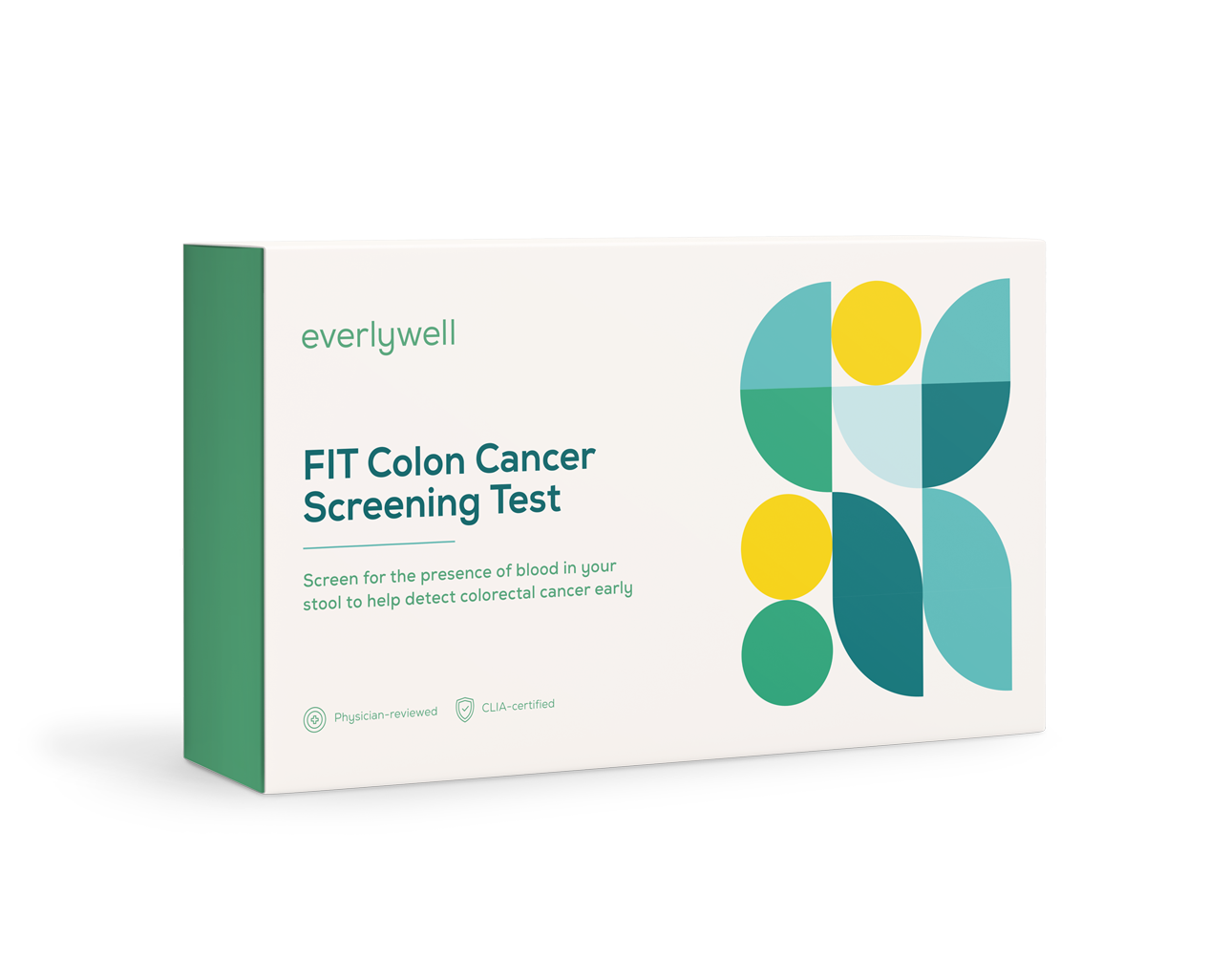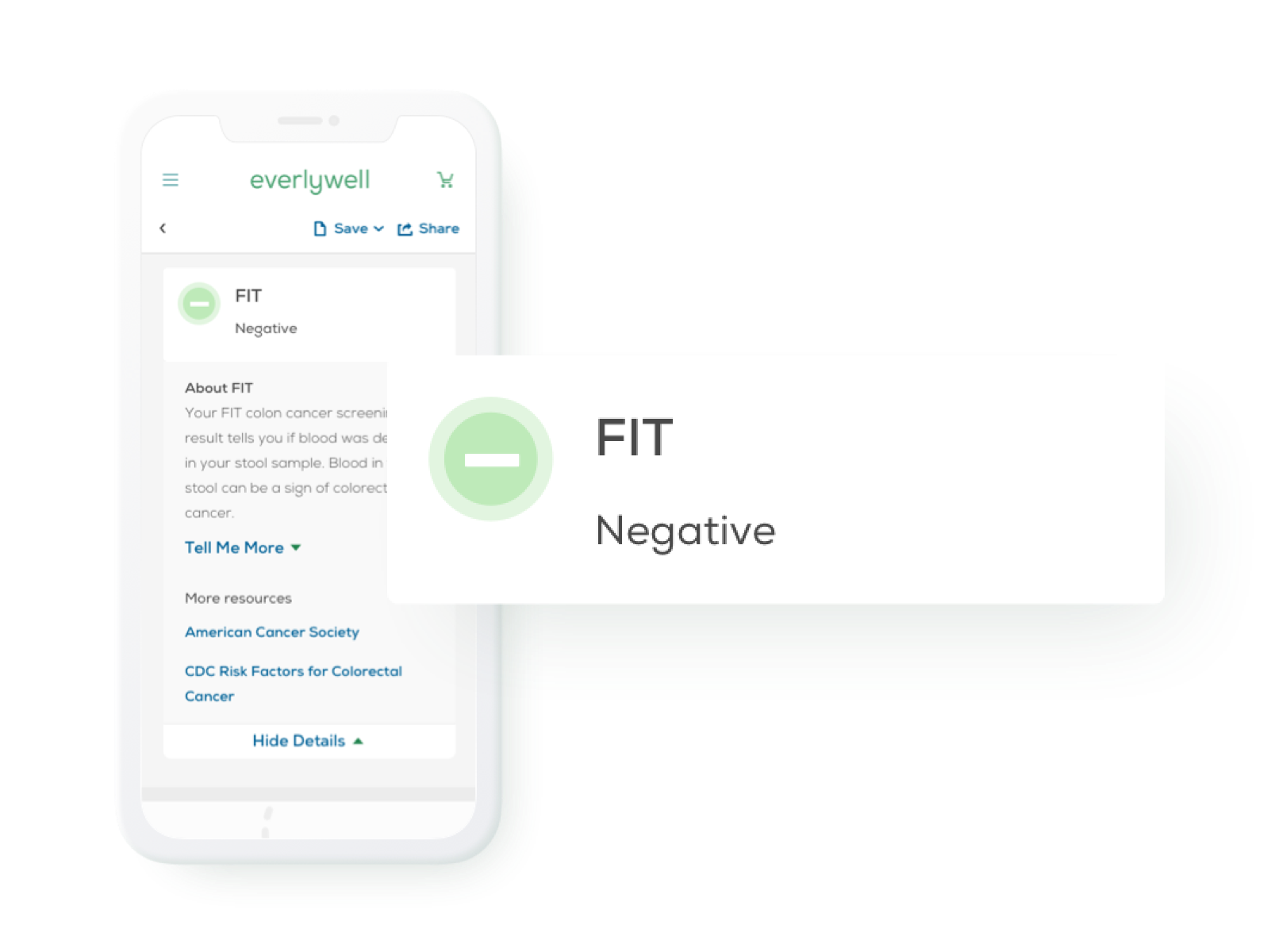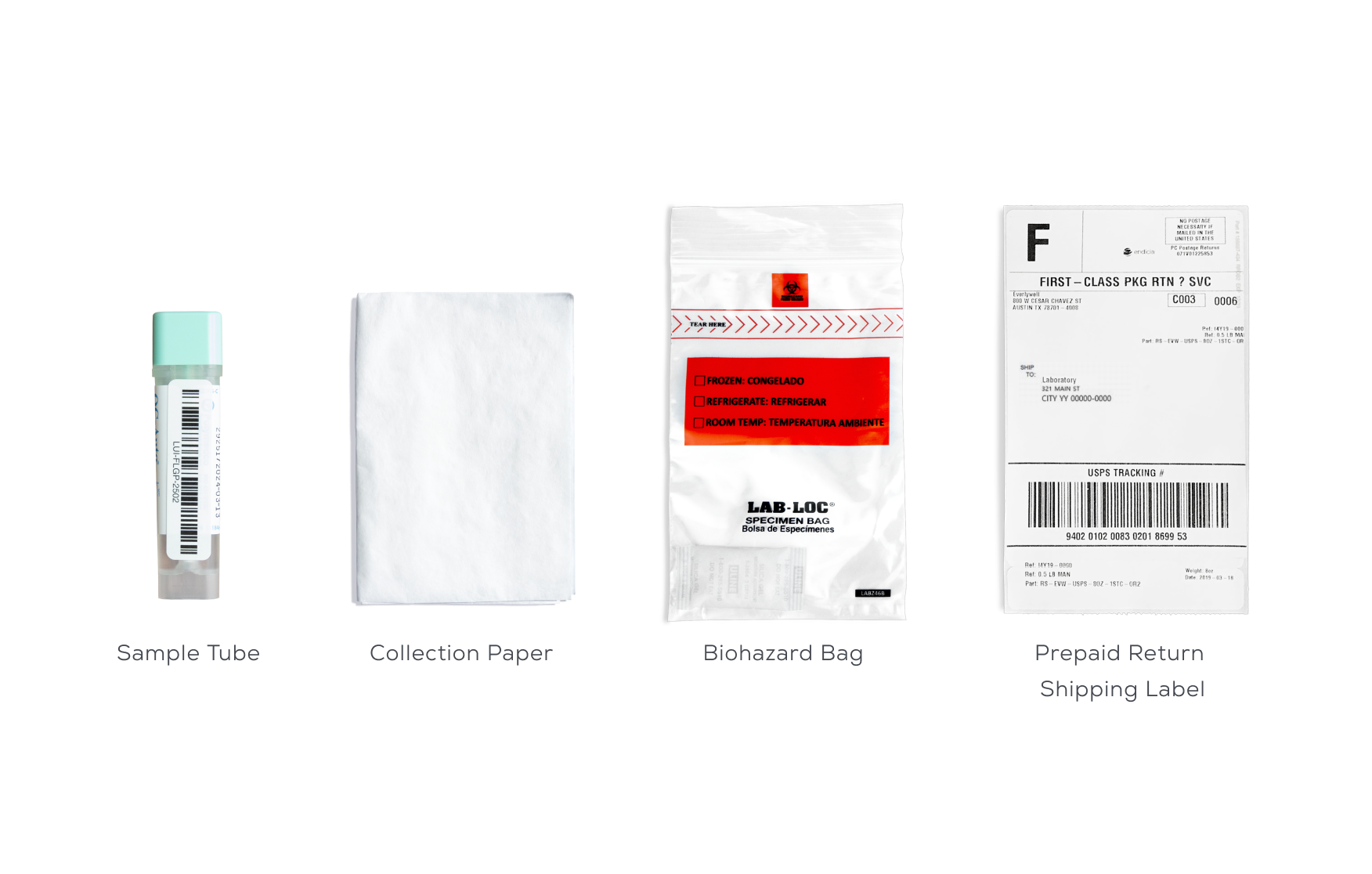








FIT Colon Cancer Screening Test
$49
154 Reviews
Free Shipping • FSA / HSA accepted
Are you 45 or older? The at-home Fecal Immunochemical Test (FIT) is designed to be simple and non-invasive. Screen for the presence of hidden blood in your stool to help detect early signs of colon cancer. You are only eligible for testing if you are 45 years or older.
Measures the presence of blood in your stool
Stool sample collection
Preventative colon cancer screening from home









FIT Colon Cancer Screening Test
154 Reviews
Are you 45 or older? The at-home Fecal Immunochemical Test (FIT) is designed to be simple and non-invasive. Screen for the presence of hidden blood in your stool to help detect early signs of colon cancer. You are only eligible for testing if you are 45 years or older.
Measures the presence of blood in your stool
Stool sample collection
$49
Free Shipping • FSA / HSA accepted
We accept HSA/FSA payments.
Questions?
The risk of getting colon cancer increases as you get older. In fact, 88% of cases of colorectal cancers occur in people who are 50 years or older*, with the median age at diagnosis being 67 years old.**
For people who are at average risk of colorectal cancer, the U.S. Preventive Services Task Force (USPSTF), Centers for Disease Control and Prevention (CDC), and the American Cancer Society (ACS), recommend yearly FIT testing between the ages of 45-75. You can learn more about the different types of colorectal cancer screening tests under the section “how does this colorectal cancer screening test compare to others.” An independent physician will determine whether to authorize your FIT test request, if appropriate.
For people above the age of 75, other factors must be considered, such as general health and willingness to undergo intervention should your FIT screening results be positive.
You’re considered to be at average risk if you do not have:
The age of initial FIT screening and surveillance intervals are highly dependent on the nature of the risk for individuals who are considered high risk. If any of the above apply to you, it is recommended you follow up with your healthcare provider about when to initiate colorectal cancer screening, what type of screening test is most appropriate, and how frequently you should repeat screening.
* American Cancer Society: Colorectal Cancer Facts & Figures 2020-2022
** National Cancer Institute: SEER Cancer Stat Facts−Colorectal Cancer
This colon screening test is not a replacement for a colonoscopy. The test is designed to show if blood is detected in your stool, which may be associated with colorectal polyps and cancers. False positive and false negative results may occur. Any positive FIT test result should be shared with your healthcare provider and followed up with a colonoscopy. Do not use this test if you have adenomas, inflammatory bowel disease, certain hereditary syndromes, or a personal family history of colorectal cancer. All tests are ordered and reviewed by an independent physician. Individuals age 75+ should follow up with their healthcare provider about the benefits and risks of screening.
For people who are at average risk of colorectal cancer, the U.S. Preventive Services Task Force (USPSTF), Centers for Disease Control and Prevention (CDC), and the American Cancer Society (ACS), recommend yearly FIT testing between the ages of 45-75. You can learn more about the different types of colorectal cancer screening tests under the section “how does this colorectal cancer screening test compare to others.” An independent physician will determine whether to authorize your FIT test request, if appropriate.
For people above the age of 75, other factors must be considered, such as general health and willingness to undergo intervention should your FIT screening results be positive.
You’re considered to be at average risk if you do not have:
- A family history or predisposition of colon cancer (such as Lynch syndrome or familial adenomatous polyposis)
- A personal history of inflammatory bowel disease (ulcerative colitis or Crohn’s disease)
- A personal history of colorectal cancer, adenomas or other related cancers
- A positive result from another screening method in the last year
The age of initial FIT screening and surveillance intervals are highly dependent on the nature of the risk for individuals who are considered high risk. If any of the above apply to you, it is recommended you follow up with your healthcare provider about when to initiate colorectal cancer screening, what type of screening test is most appropriate, and how frequently you should repeat screening.
* American Cancer Society: Colorectal Cancer Facts & Figures 2020-2022
** National Cancer Institute: SEER Cancer Stat Facts−Colorectal Cancer
This colon screening test is not a replacement for a colonoscopy. The test is designed to show if blood is detected in your stool, which may be associated with colorectal polyps and cancers. False positive and false negative results may occur. Any positive FIT test result should be shared with your healthcare provider and followed up with a colonoscopy. Do not use this test if you have adenomas, inflammatory bowel disease, certain hereditary syndromes, or a personal family history of colorectal cancer. All tests are ordered and reviewed by an independent physician. Individuals age 75+ should follow up with their healthcare provider about the benefits and risks of screening.
Colon or colorectal cancer usually develops slowly over a period of many years. It often begins as a non-cancerous—but abnormal—mass of tissue (called a “polyp”) that grows along the inner lining of the colon or rectum. Polyps can eventually become cancerous—especially a particular kind of colorectal polyp known as an adenoma.
In general, colorectal polyps (meaning found in either your colon or rectum) will not cause symptoms. This is why routine screening is so important—so you can catch colon cancer early and treat it accordingly.
We recommend speaking with your healthcare provider right away if you are experiencing any of the following symptoms:
In general, colorectal polyps (meaning found in either your colon or rectum) will not cause symptoms. This is why routine screening is so important—so you can catch colon cancer early and treat it accordingly.
We recommend speaking with your healthcare provider right away if you are experiencing any of the following symptoms:
- Alternating or chronic diarrhea or constipation
- Very thin “pencil” stools
- Persistent urge to have a bowel movement
- Significant weight loss
- New or worsening pain in the abdomen
You do not need to fast or change your diet or any medications prior to testing. However, you should wait to be tested if you are experiencing any of the following:
- Bleeding from hemorrhoids
- Currently menstruating
- Blood in the urine
- Recent GI surgery
- Recent diverticulitis flare
Your FIT colon cancer screening test results will show you if you are negative or positive for blood in your stool. A positive FIT result does not mean that you have colon cancer—it simply means you need to share the results with your healthcare provider to discuss next steps (which may include a colonoscopy).
Positive results from a FIT Colon Cancer Screening Test should be discussed with your healthcare provider and followed up with additional testing (such as a colonoscopy) to determine the cause of blood in your stool. While the Affordable Care Act requires most health plans to cover colorectal cancer screening tests at no cost to the patient, some insurers may consider a follow-up colonoscopy to be a diagnostic test which may be subject to out-of-pocket costs such as co-pays and deductibles. When scheduling a colonoscopy, it’s helpful to review your health insurance plan for specific details, including whether your healthcare provider is on your insurance company’s list of “in-network” providers. Call your insurance provider to check how much, if anything, you should expect to pay for your colonoscopy and to ask any other coverage-related questions you may have. This can help you avoid surprise costs.
Various types of colorectal cancer screening tests can be performed prior to a colonoscopy (which is an out-patient procedure done by your physician to look inside your colon and rectum using a flexible tube).
This fecal immunochemical test (FIT) is easy to do, and studies suggest it is more sensitive compared to the guaiac-based fecal occult blood test (gFOBT) for detecting colon cancer. Both of these colon cancer screening tests are known as FOBTs (fecal occult blood test) because they are intended to measure very small amounts of blood in your stool—which is invisible to the eye. The Everlywell FIT Colon Cancer Screening Test is a convenient, non-invasive screening option you can use from the comfort of home. There are no restrictions other than age to use this screening method; sample collection simply requires that you send a small stool sample back to the lab.
A guaiac-based fecal occult blood test (gFOBT) also detects blood in the stool but may also detect blood from further up the digestive tract, like from the stomach. A FIT test is more specific to detecting blood from the lower part of the gastrointestinal tract. Certain foods or drugs can also affect your results such as aspirin, ibuprofen, red meats, and vitamin C supplements, which may need to be avoided prior to taking this type of stool test for colorectal cancer screening.
A stool DNA (or FIT-DNA) test specifically looks for mutations of polyp DNA in your stool. The stool DNA test typically requires you to send an actual stool sample back to the lab for processing, but collection can still be performed at home. However, studies have shown that the specificity (true negative rate) is lower than that FIT—meaning there have been more positive results where a follow-up colonoscopy was negative.
If you are unsure which screening method is right for you, please follow-up with your healthcare provider who can discuss your medical history in more detail.
This fecal immunochemical test (FIT) is easy to do, and studies suggest it is more sensitive compared to the guaiac-based fecal occult blood test (gFOBT) for detecting colon cancer. Both of these colon cancer screening tests are known as FOBTs (fecal occult blood test) because they are intended to measure very small amounts of blood in your stool—which is invisible to the eye. The Everlywell FIT Colon Cancer Screening Test is a convenient, non-invasive screening option you can use from the comfort of home. There are no restrictions other than age to use this screening method; sample collection simply requires that you send a small stool sample back to the lab.
A guaiac-based fecal occult blood test (gFOBT) also detects blood in the stool but may also detect blood from further up the digestive tract, like from the stomach. A FIT test is more specific to detecting blood from the lower part of the gastrointestinal tract. Certain foods or drugs can also affect your results such as aspirin, ibuprofen, red meats, and vitamin C supplements, which may need to be avoided prior to taking this type of stool test for colorectal cancer screening.
A stool DNA (or FIT-DNA) test specifically looks for mutations of polyp DNA in your stool. The stool DNA test typically requires you to send an actual stool sample back to the lab for processing, but collection can still be performed at home. However, studies have shown that the specificity (true negative rate) is lower than that FIT—meaning there have been more positive results where a follow-up colonoscopy was negative.
If you are unsure which screening method is right for you, please follow-up with your healthcare provider who can discuss your medical history in more detail.
Would you like to order this test?
This order counts as one free test included in your membership. Your order will be processed immediately and shipped to your address on file.
Shipping Address
Edit
,